The worst part about Black Mirror’s Star Trek homage “USS Callister” is that for ten minutes, I felt sorry for Robert Daly (Jesse Plemons). Despite being CTO of a major company making the best in immersive space adventures through the game Infinity, he is nonetheless recognized as neither a leader nor any sort of admirable man. Softspoken, awkward, downtrodden, he inspires no small measure of pity, and enough sympathy that we viewers don’t begrudge him his forays into simulated space. Plugged into a VR experience hearkening back to his beloved science fiction series Space Fleet, he is Captain Daly, a Kirk lookalike in charm and talk: suave, brilliant, courageous, beloved, victorious. In a complete 180 from how he’s treated in real life, he gets to live out his fantasies of being a hero. What’s the harm in that?
Spoilers for Black Mirror’s “USS Callister.”
Daly’s existence is the character arc we’ve been fed in countless narratives: the misunderstood (often white) man, ignored, underestimated, unappreciated. In this case, he co-founded Callister and created the code and universe for Infinity, yet his buddy Walton (Westworld’s Jimmi Simpson) takes all the credit for the company’s success and enjoys those rewards, while Daly toils away in the literal and figurative backend. Yet not even there does he have any control over his staff; his developers walk all over him, the female employees giggle behind his back at his absence of charm and self-assuredness, and he’s not even the beta to Walton’s alpha; he’s so far down the pecking order that his employees forget that he’s actually their boss. All he wants to do is make Infinity great, yet he gets no appreciation. This archetype has become so ubiquitous that we as audiences fill in the emotional gaps: Poor guy, there must be a reason that he is so inept at engaging with his peers. Good for him—he’s created his own way to fit in, even if it’s another world. He’s brought so many people joy with creating Infinity, of course he deserves his own happiness.
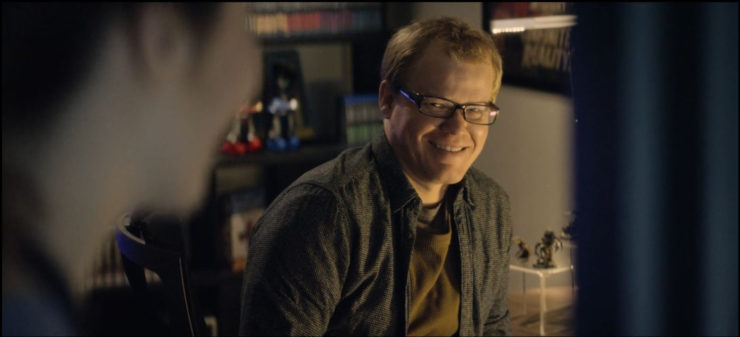
Thankfully, because this is Black Mirror, at the ten-minute mark of a 74-minute episode (its longest this season), Charlie Brooker reminds us that it’s not technology that’s the problem, it’s the people using it. There is a breathless moment, in which Daly snaps on a pair of gloves and fishes a coworker’s coffee out of the trash, that his seemingly harmless awkwardness solidifies into full-on creepitude. Space Fleet isn’t Daly just playing around in a VR game populated by bots that happen to resemble his officemates; he has systematically stolen their DNA and uploaded self-aware, sentient digital copies of real people to his own private server not connected to the larger Infinity universe. His “loyal crew” are his prisoners, trapped in an eternal pocket universe playing out the fantasies of an asshole god. Suddenly the forced cries of “hip hip, hooray!”, the female crew members swooning into Daly’s arms for his expected celebratory kisses, and the neverending loop of inane Space Fleet plotlines take on a sinister tint.
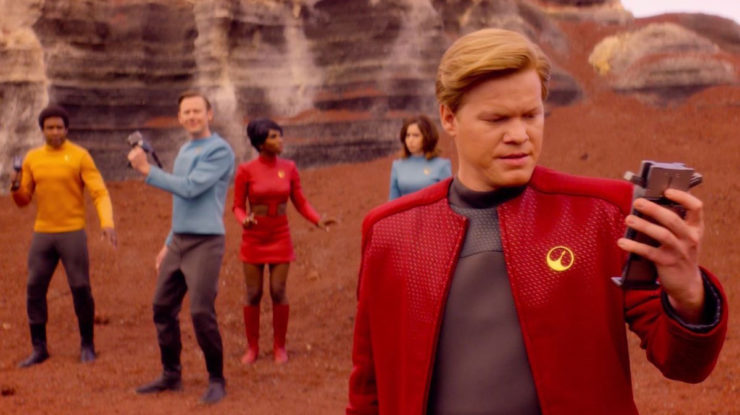
This is Daly’s playground, and these are his toys.
Or, in fanfiction terms: This is Daly’s work in progress (WIP), one in which he is the Gary Stu. That’s the male equivalent of a Mary Sue, the ultimate self-insertion character who can do no wrong. The Space Fleet pocket universe is a masturbatory (figuratively, since there are no genitals in Space Fleet) fantasy in which he is the brightest, the strongest, the bravest, and most importantly, invincible—but it’s also self-preservation, a precaution against a crew who would gladly murder him on an away mission or when he goes AFK to answer the door for the pizza delivery man. Robert Daly may be trod upon by his subordinates and superiors alike, but Captain Daly cannot be defeated.
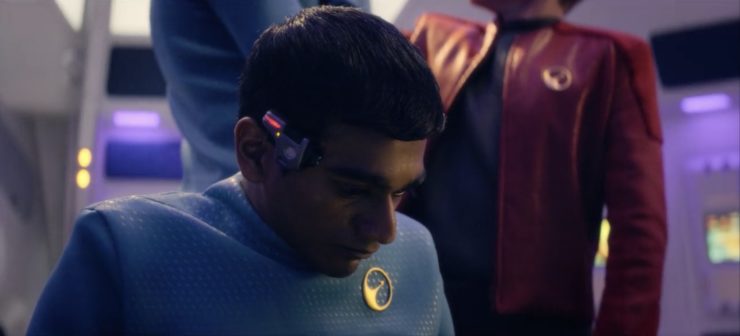
Until, that is, he brings in his shiniest new toy. Nanette Cole (Cristin Milioti) is a brilliant coder, and Daly’s biggest fan to boot. With this adoring new hire looking for a mentor figure, his real life should be looking up… until his officemates, like chatty customer service rep Shania (Michaela Coel), warn Nanette away from her awkward boss. So it’s into Space Fleet for her, and that’s when “USS Callister” switches from being Daly’s story to Nanette’s, as she cycles through disbelief, horror, and panic to anger and resolve to escape.
Interestingly, Nanette is very much not a Mary Sue. There’s a moment where her character seems that she could lean that way, in her simple but noteworthy exchange with developer-turned-diagnostics crew member Dudani (Paul G. Raymond) about hacking into Daly’s program. “You won’t hack it,” he says. “I’ve tried.” She just looks at him: “I haven’t.”
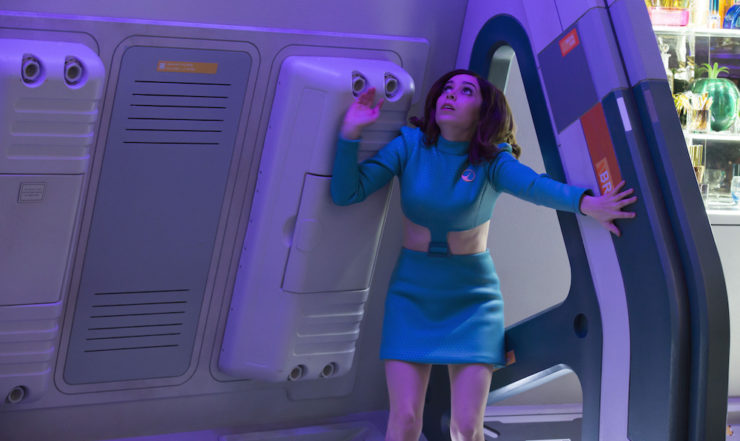
It’s the kind of self-assured statement that is usually followed by a Mary Sue listing her dozens of other accomplishments, or what singular training/Chosen One-ness has granted her this ability. But that’s not the case here; Nanette is a brilliant coder, yes, but just as she says about Daly, a coder is not a god, a coder is fallible. This Nanette, the copy in the Space Fleet simulation, responds to the crushing news that they can’t escape with rashness, with a blind need for action that doesn’t take into account how her plan could fall apart—and that’s thanks to real-world Nanette, who is too trusting of her idol Daly to believe that the message she receives (HELP PEOPLE TRAPPED IN ROBERT DALY’S GAME) is real, and who asks him about it outright instead of suspecting that something might be wrong. Real-world Nanette is more easily manipulated than Space Fleet Nanette, which initially hamstrings the trapped crew but then also delivers their salvation in the episode’s best little twist:
What saves them, and what dismantles Daly’s private universe, is revenge porn.
It’s an audacious move by Brooker and co-writer William Bridges, who also penned last season’s shocking episode “Shut Up and Dance.” In that episode, victims are blackmailed with incriminating photos or information into performing a series of tasks, from seemingly innocuous stuff like delivering a cake to desperate fights to the death. The spoiler in that case is that Kenny, the hapless teenager whose awful day we follow, actually deserves to be put through the wringer for watching child pornography.
But in Nanette’s case, she didn’t do anything wrong; the photos were private, from a lost weekend with a forgotten ex-boyfriend. It’s not even clear if her ex saved the photos, as Space Fleet Nanette hacks into her own photo cloud to produce the incriminating evidence; even when Nanette is the sole owner of the photos, they’re still used against her. The male crew members don’t understand how this could ever be enough leverage, but Space Fleet Nanette grimly responds, “I would do anything to keep those from being released.”
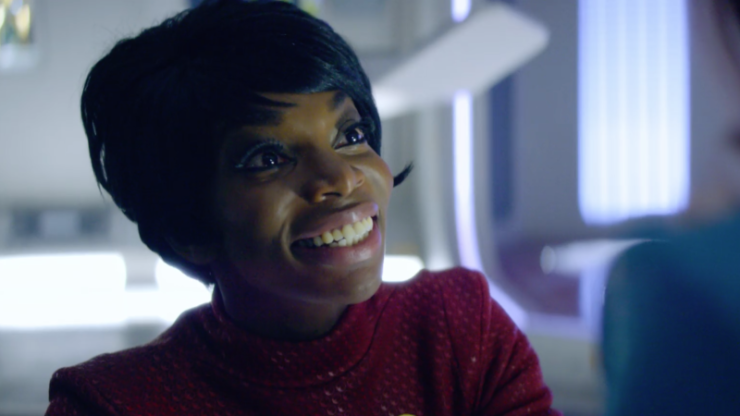
This is just one of the concessions that the female crew members undertake for their own self-preservation, but they’re all the same theme: reducing themselves to objects, to playthings. If you watch the episode more than once, you see how stiffly receptionist Elena (Milanka Brooks) holds herself in Daly’s arms for the kiss, how widely and fakely Shania grins to cover her revulsion, how Nanette learns to soften her eyes and stroke her captain’s ego. Daly’s way to self-preservation is to raise himself up, to become untouchable; by contrast, Elena, Shania, and Nanette let themselves be lowered to Daly’s view of them. The scene in which Nanette must distract Daly on an away mission with an impromptu dip in the water is fascinating to watch; she’s tense to tautness, her wide smile belying her shifting eyes as she hopes that her romping around in a bikini is enough to convince him to join her. Her splashing Daly to keep him in the water with her is a testament to Milioti’s acting, as she giggles like a ’60s beach babe, but every time the water momentarily blinds him, her smile drops and she looks utterly revolted, only to yank the mask back up when he’s cleared his eyes.
It’s layers upon layers of nuance that Daly couldn’t even begin to parse. It’s clear from the start that this man is emotionally stunted, his habits and desires childlike in their simplicity: chocolate milk, play Space Fleet, strawberry milk, use his real-life condescending boss as a footrest, vanilla latte, throw a digital copy of his boss’ son out of the airlock. He is a one-dimensional character, which makes his ultimate fate worthy of applause: trapped in his Space Fleet mod as it shuts down around him, his controls taken away like a child’s favorite toy so that his cries of “exit game” go unfulfilled. And the real Daly sits slack in his computer, still connected to his game, behind a door that says “Do Not Disturb” and a ten-day Christmas vacation. It’s an update of the ending to “White Christmas,” in which the villain isn’t exactly being tortured, but is a pathetic prisoner of his own devices.
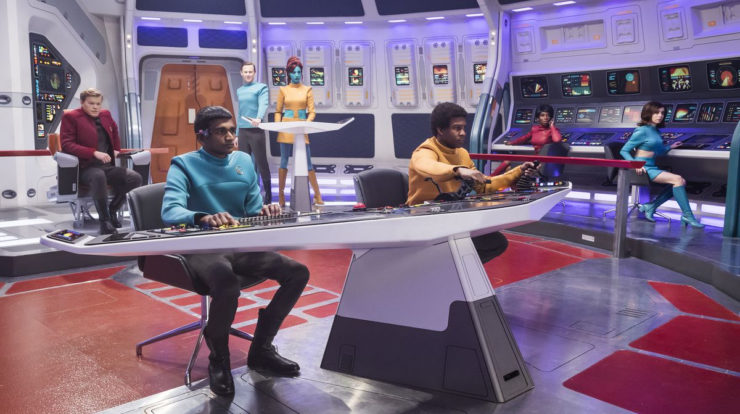
Never, however, does Black Mirror criticize the notion of escapism. Infinity is a celebrated game with a healthy fanbase, a rich digital universe that promises rewards to its most intrepid explorers. Earlier in the episode, Captain Daly tells Nanette, “Space Fleet is a belief system based on the very best of human nature,” with its ultimate goal the betterment of the universe. Daly’s own words turn against him; he is not interested in the betterment of the universe, in the good fortune of anyone but himself, and so he does not deserve the escapism the way that others do.
Which makes the ending of the episode bittersweet: Nanette, Shania, Elena, Dudani, Packer (Osy Ikhile), and bro-villain Valdack (Billy Magnussen) escape Daly’s pocket universe through a wormhole that deposits them into the real Infinity—complete with sleek costumes and enough lens flares to make J.J. Abrams cry with joy, in a sly nod to his Star Trek reboot. Walton has sacrificed himself to give them that final push through the wormhole, which leaves Nanette as the acting captain. (“Really, Nanette is fine.”) Freed from Daly’s control, they can explore Infinity as they choose. Can they die? Is this still a form of torture, an afterlife they never asked for while their real selves go on with their lives unaware of their copies? Black Mirror doesn’t answer these questions, and the series’ worldbuilding with regard to these digital copies is fodder for an entirely different essay, but for the moment, the answers are not important. There’s exploring to do.
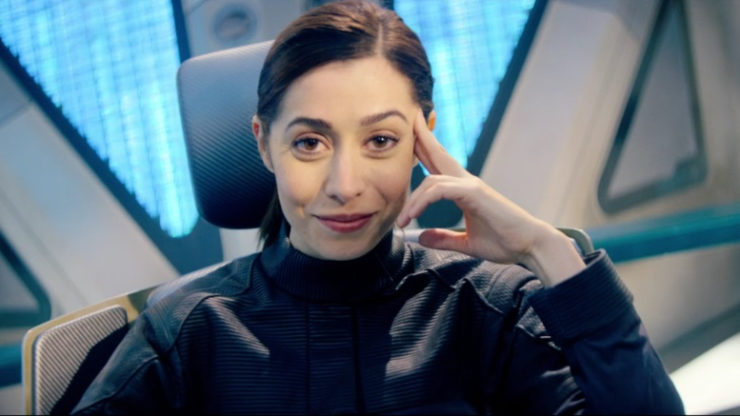
Other Reflections
- Redshirts are universal in any sci-fi homage: Shania getting turned into the arachnid monster, but then also (and I didn’t even get this) with Daly’s fate.
- Did you catch the mini Breaking Bad reunion at the end with Aaron Paul as Gamer691? There was also a blink-and-you’ll-miss-it moment of none other than Kirsten Dunst (who’s engaged to Plemons) in the Callister offices.
- Along with “White Bear” and “Shut Up and Dance,” “USS Callister” marks the third time that Black Mirror has used the narrative trick of introducing viewers to a character in a universally sympathetic situation (chased by killers; blackmailed; ignored and underappreciated), so that they automatically assume that this is the protagonist. I remember there being some backlash last year with regard to using it in “Shut Up and Dance,” but I don’t think this episode has earned the same ire, probably because Daly’s true nature is revealed early on.
There are so many more details and moments in this episode that I didn’t get to, but that’s what the comments are for! Tell us what you thought of “USS Callister.”
Natalie Zutter got to see Cristin Milioti onstage in the stirring sci-fi play After the Blast and can confirm she is just as badass in person. Dissect this season of Black Mirror with her on Twitter!











This is the first episode for which I saw the appeal of a theoretical Black Mirror Universe, the idea that some if not all of the episodes take place in the same world. How can Daly create the memory of an entire life from DNA? Well, he’s just doing what we’ve already seen in White Christmas. How weirded must Nanette be that she is blackmailed into retrieving a popsicle? After Shut Up And Dance, I’m not sure how strange that actually is.
By the way, like for White Bear, the point of Shut Up And Dance is not that those people who did terrible things deserve their terrible punishments, but on the contrary, that technology allows us to distance ourselves from people, so we don’t have to feel any compassion for them. As a consequence, it is possible to put them through the worst punishments imaginable without feeling the slightest guilt. See also Hated In The Nation, and this moment of the 2012Wipe (a pity Brooker didn’t have time for a 2017 edition). In other words, the fact that Nanette is innocent is irrelevant. Sure, if we had more open views about sexuality, revenge porn wouldn’t even be possible; but the point Brooker is making is that as long as anyone has anything to reproach to anyone, and they don’t see them as people anymore, there’s no limit to the punishment that can be inflicted upon them, however small the slight: be it bringing the wrong sandwich or insufficient smiling. Similarly, I didn’t cheer when Daly ended up trapped in his fake reality (even though that was necessary, as anything less would have guaranteed he would have recreated the mod and harvested more DNA. One more flaw in Nanette’s plan, even though something had to be done, no matter how imperfect), I was just hoping he would soon die of thirst: if no one came to visit him for Christmas, it’s unlikely anyone would come to free him in the next few days. And I was glad that contrary to Playtest and White Christmas, the game was mostly in real time, because I don’t think any crime is awful enough to deserve an eternity in the void.
One HUGE problem with this episode-
How do you get a person’s memories, character, etc. from their DNA? That is not how DNA works. It’s as possible to clone the (for lack of a better term) being of a person from their DNA as it is to clone them in the clothes they were wearing and the change in their pockets when you took the sample.
I am fully aware that the Space Fleet universe would use soft science, as that is the style of it, but that does not mean the ‘real’ world can get away with it. You want to say that Daly was able to get all that from computer databases or the like, and build a facsimile of the person that he ‘kidnaps’, sure, maybe (though I doubt Nannette would know about the pics in her cloud from that). But one, they are very clear that is not what he did, he used only DNA, and two, if he did do that he could get their physical likenesses from pictures as well, so what the hell does he need the DNA for?
For a show that otherwise has shown a strong grip on the tech they are speculating about, this was a shock to the system to see them do something so shoddy here.
Sounds like Daly is a more successful version of Barlclay – and you’re saying that you think he deserved to die for his power fantasies? Seems a little bit harsh.
Great episode, it has a perfect Star Trek ending and at the same time a perfect Black Mirror ending.
@3 – Torvald: Can you really not see the difference between Barclay and Daly?
@@.-@: I haven’t seen the episode, so I’m going only by what I’ve read here.
From what I can tell, Daly is essentially harmless as far as his employees are concerned (if somewhat creepy). Was he even be aware that his creations are sentient and self-aware?
So any kind of AI developer has earned a death sentence if he was cruel to his AI (e.g. Harold Finch in Person of Interest)?
One thing which the article glosses over is the way in which the story here hinges on sex. Both real world and game world Nanette are motivated by it: RW through the revenge porn, GW through the theft of her sexuality Daly applies through his mods. It isn’t until she realises her genitals have been deleted that she decides a “red line” has been crossed and it is not acceptable to just make do with the situation. The ultimate victory of the copies is when they realise that not only have they survived the trip through the wormhole, but they are “all all there”; that which that has been taken from them has been returned. Viewed in this light, the revenge porn element of the story takes on a slightly different tone. Ironically, it’s actually Nanette using her images as she chooses, to blackmail herself. Absent any codeword she can use to explain her situation convincingly to herself, she has to focus on the one thing she knows better than anyone else, her weaknesses. Sexuality in this episode is therefore both a strength and a weakness. It’s noteworthy that none of the crew think any less of her after viewing the lurid images, though they comment on them at the time of viewing. In a way, they have an insight into her motivations as this is clearly a sexually adventurous individual who, like them, has had that ability taken away unjustly, and as such they empathise with her rather than condemning her.
On the subject of whether Daly deserves his fate, in my opinion it hinges on information that’s difficult to glean from the episode: does he view the crew as real people at all, or mere simulations? Arguments could be made either way: he clearly understands that they can be motivated in the same way as their real world counterparts given his treatment of Walton and his son. But at the same time he interacts with them in an entirely different way from his employees in the real world. If he truly understood that they are as real as their selves outside of Infinity, wouldn’t he be just as intimidated by them as he is by those same real employees? Are the crew even real? What constitutes a human soul?
Genetic memory is one of those ideas that seems to linger, even more than what was happening in Caprica, I think it’s a slight misunderstanding of biology, but sometimes it may just be a convenient story tool.
Anybody spotted any I Have no Mouth and I must Scream references yet?
2@@@@@: That was the one serious dud point in the story for me as well. It was just too silly about real known science to work as honest handwavium.
@8/LordVorless: Yeah, my wife brought it up as a bit of a fridge logic problem, but I merely shrugged and said that I didn’t really notice since the episode followed the standard trope. I viewed it similarly to things like FTL travel, sounds during space battles, and a bunch of others: too common in the genre to be worthy of much notice.
While watching the episode I was primarily impressed with just how thoroughly they got Star Trek, with the set design, costuming, incidental music, and all. A bit later it struck me that such an accurate homage to TOS was also an inspired choice given the epsiode’s story and themes, seeing as the show was considered at the time to be progressive and empowering for women but can look painfully backwards and sexist now. That bit of cognitive dissonance (for a twenty-teens viewer, at least) adds a nice bit of subtext to Daly’s implementation of his fantasy and Game!Nanette’s ability to wrest control.
Loved the episode but I’m not sure the ending was necessarily good for the crew. After all, they’re now trapped in a universe full of fanboy on-line gamers. Trapped, in fact, until they literally die. Brrrrrr….
@5:
Creepy isn’t harmless. Part of the reason we’ve got such a massive problem in general employment, and specifically in IT, is that we’ve been excusing creepy as being harmless for far too long. Creepy is not harmless, it active encourages slippage into more harmful ways of thinking and acting.
The divisiveness of this specific episode is a good thing, it is making a lot of the guys who are creepy in their own lives confront the inherent unacceptable behaviour and ways of thinking in a way that they can’t excuse. It makes them angry and defensive. I like that. Maybe it’ll even get one or two to stop being creepy.
From the description of this episode, I’m reminded a bit of William Tenn’s “The Malted Milk Monster.”
@5 – Torvald_Nom: Watch the episode. He’s cleary aware that they are sentient.
@6 – Zommael: He doesn’t behave that way with his real world employees and partner because he’s not all-powerful there.
I’ve seen it twice now and enjoyed it thoroughly each time, the whole thing with the dna is a bit cringeworthy but maybe the system builds up their personality and memories from online profiles? This is 5 minutes in the future we’re talking about, people’s lives will be lived far more online than they are now.
I can handwave it because what we get as a result is something that feels extremely timely and worth dragging kicking and screaming into the light. I think only Jesse Plemons could play this sort of charming naivety with a sadistic streak and it’s interesting how it opens with that full retro look: it’s like that’s how Daly sees this world he’s made.
I was well impressed with the actor playing Walton as well and the unbelievably bleak story of what Daly did to break him.
So much to unpack.
I also have to say that I did immediately make a connection to Barclay in TNG though I believe he only reskinned holodeck characters to look like ship officers? Still creepy but I don’t remember him being sadistic and he did receive counselling for it whereas Daly is irredeemable. Superficially though you can see the resemblance, I mean Daly is also suffering somewhat from holodeck addiction.
@2 that bugged me as well. In my mind Daly included a script into the Infinity backend that would upload to his personal computers a copy of the consciousness of selected players. He waited until each of his targets logged into the game to copy their whole consciousness. This was an easy workaround, but it wasn’t adressed.
What happens with the real world Nanette? When Daly is found dead after the Christmas break, it is likely to be treated as suspicious. She was not wearing gloves, so her fingerprints are probably on both the glass door and the refrigerator. Investigators will also find the call from her phone to the pizza place.
@18: That’s clearly a malfunction with his software or hardware. It’s true there is still the device brought by Nanette, but it’s not the one on Daly’s corpse and it would probably be ignored. Since it’s Black Mirror, we can think that those kinds of murders are common enough to be a reasonable hypothesis, and Digital Forensics would probably take the case. Then it depends how thoroughly the game was deleted. In any case, if it was a murder, it had to be murder by software, which makes the analysis of physical space useless.
I assumed the investigation would conclude it was an accident, since there is nothing suspicious on the computer. After all, that’s what happened in Playtest. But even in our worlds, a few people have died from playing MMO: since the cause of death is the same, there nothing strange on the computer, and Daly didn’t have any known enemies, I don’t see why the detectives would bother Nanette.
This episode is exactly how I like a short story to be written, with the person who did the bad stuff getting his just deserts in the end, a nice twist, and leaving the protagonists alive to fight another day. As for the DNA problem, I will ignore that, filed away with “dilithium crystals: how do they work?”, “beam me up”, and “midichlorians”.
I love this show, so delightfully twisted and dark.
I find it interesting that people complained that the central character of “Shut Up and Dance” was treated like a relatable person for too long. Doesn’t someone with a serious mental illness, with no apparent history of harming anyone (it’s doubtful he paid anyone for the video), deserve treatment, rather than being set up for a fight to the death? And just maybe a little human sympathy? Wasn’t part of the point of the episode that “vigilante justice” like that is wrong, because even people who do horrible things are still… people?
I agree with you, Martin.
@22: People said the same thing about White Bear. So in Shut Up And Dance, Brooker made the crime a mere footnote to the episode instead of the entire epilogue (“they’re saying it’s kids… that you’ve been looking at kids”). That still wasn’t enough. So in Hated In The Nation, the whole message is “if you wish death upon someone, whatever the reason, YOU WILL DIE”. Apparently it’s still too subtle for some.
Then again, White Christmas shows that even official authorities have no problem with cruel and unusual punishment, so I’m not sure whether Brooker’s point is only about mob justice.
I don’t see why you can’t both feel sorry for someone and think he got what he had coming, that someone is a pitiable creature and that it’s no excuse for what he did.
I liked the idea I was left with at the end of the episode, that his terrible “work in progress” game died with him. Theoretically someone could find it and recreate it, but it’s more likely that it’s either too complex to understand or no one cares to try. Plus the new update seemed to wipe it. I also was left with the feeling that with coding, if the result comes out wrong, it’s your fault. If you enter something as complex as AIs with human memories and emotions, there is no way to anticipate the result. I guess that’s kind of the moral story of the Black Mirror though.
I’ve just watched Hollow Pursuit, and I must concur: there is little difference between Daly and Barclay. In the first scene on Ten-Forward, Barclay is behaving like Daly, bullying the colleagues he couldn’t stand up to in real life. It’s even worse, since they’re playing their own roles. Of course, the fact that the people on the holodeck are not self-aware, and are programmed to enjoy what they are doing are important differences. In both cases, the men of the crew admire the creator of the simulation and claim he’s a model, and the women all want to have sex with him. On the USS Callister, they’re all pretending, and on the holodeck, they’re as sincere as their programming make them. Troi claims there is nothing wrong in using fantasy to escape a difficult reality (as long as it’s not a means to altogether avoid facing their problems), but like the others, she gets angry when she’s confronted with her double.
The fact the crew of the USS Callister is self-aware makes it unambiguously wrong, but were they not (as in the holodeck case), I don’t know. I really can’t tell how wrong it would be to write fiction in which I would abuse obvious inserts of people I know.
As often in Black Mirror, technology is just a tool. But we have to ask: to we really need tools that can so easily be used for abuse?
Indulging in sadistic fantasies in the privacy of your own VR program may not be good for your mental health but what puts Daly over the line is the fact he is knowingly tormenting self aware entities. In fact he is creating such entities specifically to torment. Very, very bad.
Yeah, a guy who is a little timid and gets harassed in real life but takes it out on fake copies of people in a virtual fake world doesn’t deserve to get help, he deserves to DIE.
That would be a valid comment if Daly was not deliberately creating self aware replicas of his staff to torment. I think he may be past help.
30, there is room between “getting effective treatment” and “just execute him” that leaves some room for acceptable outcomes. And that’s not even getting into the method of execution, which can range from “Let’s do it humanely” to “To the pain!” as it were.
But how could they arrange for Daly to get treated, or even prosecuted for his crime.?
32, if the creators of the show wanted to arrange it, yes, that could have happened. And if they decided not to go that route, then exploring the tragedy of that would also be worth examining.
I think what people are having a problem with, is that they perceive that the message is it’s all-right to just write somebody off, let’s have a party. I already quoted the Caine Mutiny’s denounement today, but it kinda of points out the situation.
Oh I see, you are objecting to the creative decision of the writers. Well that’s legitimate.
34, well, I’m not sure the concerns are limited to the writing, there seems to be discomfort with the fan reaction, as seen in post 22.
Personally, I see a huge difference between Daly and Barclay. When confronted with the issues with his holodeck program, Barclay did get treatment. And while our favorite awkward genius remains awkward, he does get better. I never saw anything malicious in Barclay, even when he became “god”.
In contrast, Daly knew he was torturing sentient digital copies of his co-workers. The brilliant monologue where Walten tells the story of his son is proof of that. And so in here is the question of “what makes someone ‘real’?” And you can hash that out for yourselves. But if we go by intent, Daly has gone so far down the evil rabbit hole that I’m not certain he could have been pulled back out.
When Barclay encountered a hologram who asserted that he[the hologram] was alive and sapient the first thing Barclay did was try to help. Barclay showed compassion and empathy and while he may have got a bit too involved with holodeck characters, as soon as one of those characters showed signs of self awareness he set aside the games in order to try and help.
In no way…dany deserves to die… Yeah of course he was a bit creepy…like ‘stealing’ people’s DNA… ‘staring’ at a girl(awkward) and ‘thinking’ of hurting a lil’ kid for his own satisfaction.
Life of a human is way more important than of a virtual clone of something…. Don’t ya think??
And do all those people who kill character in games like GTA or Sims also deserve to die , come the f on…they are all virtual …. If you really feel bad about them, then you probably are emotionally wrecked with a very low EQ..
This is the worst BM episode.
The whole point of the episode was that this weren’t just virtual characters, but actual people with feelings and sentience even if they didn’t have organic bodies.
I’ve seen this before.
Actually, more seriously, I’ve seen a discussion somewhere on the possibility of creating a simulated universe and the ethical quandary of turning it off.
I’ll try to find the reference.
i found the sympathy created for Bob in the beginning – in the real world – wasn’t addressed in this episode. The only person in the real world affected in the end was the guy who everyone mistreated for a variety of reasons. I get we’re supposed to loathe his in-game behaviour, and I do, but that’s his fantasy world. Safer there than IRL. Did anyone else feel sorry for Bob?? :P
They make it clear that, in the context of this fiction, the clones he creates in the gameworld are sentiente, so no, I don’t feel sorry for him.
@42: Yeah, if he came to the people who treated him like shit and insisted they stop, that’d be understandable. Instead, he chose to make self-aware digital clones of them and do horrible things to them, so not so much.
@18 &19, my concern for rw Nanette is regardless whether a crime is pinned to her. She will believe she was blackmailed into assisting the murder of a man she deeply admired. The new job will take a nosedive after its key innovator is gone. And she did it to avoid her photos getting out, which could introduce another suitcase of guilt complications to unpack, possibly harming her self image and sexuality.